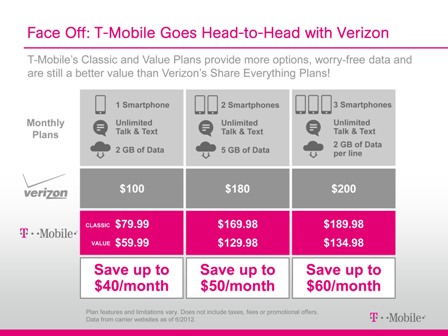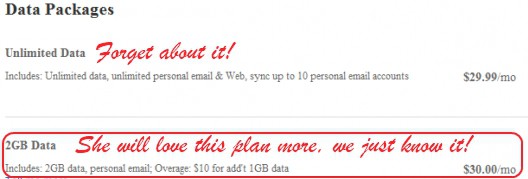Feisty T-Mobile is back on the attack, this time against Verizon’s new “Share Everything” plans which T-Mobile’s marketing gurus are calling a lousy deal for consumers.
Harry Thomas, director of segment marketing, dismissed Verizon’s new plans as costly, complicated, and punitive in a company blog post:
- They’re COSTLY – Verizon is charging more for what consumers want by raising rates on data, but promoting the “value” by pointing to unlimited talk and text even though today many consumers use less of these services. This is especially true for add-a-lines – now with Verizon’s Share Everything plans, adding a line starts at $30/month for a basic phone (non-smartphone) and, for accounts with at least one smartphone, requires unlimited minutes whether customers want unlimited or not.
- They’re COMPLICATED – Verizon is forcing customers to share data when many customers don’t know how much data they’re using, which makes it hard to stay within their limit when trying to balance multiple users (not to mention the family data hog).
- They’re PUNITIVE – At the same time that Verizon is making it harder for customers to manage overages, they are also increasing overage rates from $10/GB to $15/GB for accounts with at least one smartphone.
Thomas predicted Verizon’s new plans would deliver more benefits to Verizon’s bottom line than to consumers, and as they took effect late last week, he’s now convinced he was correct.

T-Mobile released this graphic showing its plans offer considerable savings over Verizon Wireless’ new “Share Everything” plans. Verizon is probably wishing AT&T managed to get that T-Mobile merger through, if only to stop this kind of competition.


 Subscribe
Subscribe






